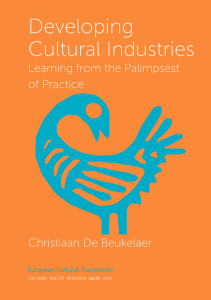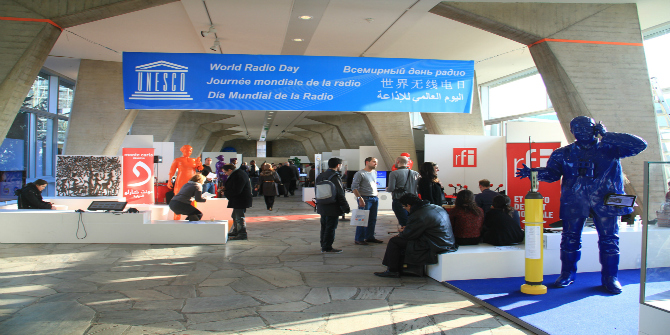What role have culture and the creative industries come to play as ‘tools’ for social and economic development? In Developing Cultural Industries: Learning from the Palimpsest of Practice, Christiaan De Beukelaer examines the implementation of culturally focused development policies in Ghana and Burkina Faso. Although it could more directly challenge the vested powers of Western agencies and NGOs that have institutionalised ‘development’ as a global industry, the book nonetheless offers critical insight into the under-researched emergence of culture as a major strand of development discourse, writes Jonathan Vickery.
Developing Cultural Industries: Learning from the Palimpsest of Practice. Christiaan De Beukelaer. European Cultural Foundation. 2015.
 Billions are spent annually around the world on development – or ‘International Development’ as we say in the UK – with varied results. Throughout the last century, wealthy countries donated to poorer countries, involving terms and conditions tangled up in post-colonial politics, economic interests and many other things often not conducive to actual ‘development’. The history of development is complex and fairly well-known, except for one strand: the cultural.
Billions are spent annually around the world on development – or ‘International Development’ as we say in the UK – with varied results. Throughout the last century, wealthy countries donated to poorer countries, involving terms and conditions tangled up in post-colonial politics, economic interests and many other things often not conducive to actual ‘development’. The history of development is complex and fairly well-known, except for one strand: the cultural.
Although the establishment of the United Nations Educational, Scientific and Cultural Organization (UNESCO) in 1946 meant that cultural policies began to be formulated as ‘development’ policies, it is only in the last decade that ‘culture’ has come anywhere near to making some measure of impact on the huge jurisdictions of economic and social development. It has done this through an emerging global enthusiasm for ‘creative industries’ or, in fact, creative anything – creative cities, even. The potential for culture and creative industries for social and economic development is now globally recognised.
Developing Cultural Industries: Learning from the Palimpsest of Practice is about this rising global trend for the creative industries – of films and video games, literature and publishing, crafts, design, fashion, the internet and so on – and how they have been used as a ‘tool’ of development in two African states, Ghana and Burkina Faso. Based on PhD field research, the book pays as much attention to the historical discourse of cultural and creative industries policies in development as it does to the implementation of policies on the ground. The aim of the book is to provide a critical insight into the problematic implementation of policies for ‘culture’, along with the equally problematic lack of substantive research on culture and its role in development.
The cultural and creative industries are intrinsically – even in the West – small-scale, risky, precarious, always changing and rarely generative of huge wealth (except for the conglomerates or huge corporations). Yet, they provide huge potential for generating other kinds of capital (social, institutional), along with the capacity for transforming immediate urban environments, the intellectual life of a city, the mobility of young people and the employment opportunities for women. After all, so-called ‘developing countries’ – a term the book challenges – are usually highly prodigious in cultural production. However, development policies for culture care less about the quality and social function of culture than they do about the market viability and economic leverage of cultural industries for national growth through international exports or the tourism industry.
The share of Africa [in the global market for cultural goods] is currently negligible and there is a lack of both infrastructure and capacity to transform the potential of the continent’s creative talent into concrete results (18).
De Beukelaer’s study is strong in the way that it connects global policymaking (principally by the UN) with local place-based issues in the cultural industries in Ouagadougou and Accra. De Beukelaer does not approach the cultural spaces, entrepreneurs, cultural projects and production processes as ‘under development’. Rather, they are under reconstruction from within an increasingly powerful creative industries discourse, industrialising their culture as ‘development’ itself industrialises their society. A central problem is that Western models of industry covertly insert oppressive assumptions of what ‘growth’ is, how it works and why economic growth remains the most central priority and framework of validation for all foreign development aid.
 Image Credit: World Radio Day event at UNESCO Headquarters, Paris (Wikipedia Public Domain)
Image Credit: World Radio Day event at UNESCO Headquarters, Paris (Wikipedia Public Domain)
The last fifteen years of global development have been framed by the UN’s eight Millennium Development Goals – which did not explicitly feature culture – and De Beukelaer himself has been active in lobbying for the insertion of culture as an explicit component of the next major planning framework. Perhaps it is the diplomatic tact required of all lobbyists that prevents De Beukelaer from challenging head-on the hypocrisy, vested power and interests of Western development agencies and NGOs in perpetuating ‘development’ itself as a global industry.
However, he does indeed broach the strategic neglect of research in their policymaking processes, and the extent to which this remains disadvantageous to African countries. The book has some good passages on the new mania among global agencies for Intellectual Property (IP) laws and their articulation of Western concepts of property and ownership. Instead, the IP codification of cultural production requires a more critical understanding of its social contexts, particularly in relation to the informal economies of street-production, piracy and non-regulated forms of trade. For how do we include current ‘pirates’ in the expanding economic development of the cultural industries? De Beukelaer has no strong argument on whether we do or not, more on whether policymakers can understand the actual role, function and sub-cultures of piracy that IP legislation naively assumes it can erase.
One of the pleasures of reading this book is that De Beukelaer is an independent thinker, and addresses issues directly. He has spent sufficient time in Africa for his writing to resonate with the kinds of political journalism, rights activism and lobbying currently involved in rethinking the complicated tangle of power, history and culture that is Africa.
De Beukelaer’s arguments particularly resonate with the recent UNESCO Creative Economy Report Special Edition (2013), in which the traditional emphasis upon trade liberalisation and exports has given way to human, social and urban development needs. This book, like the report, expresses the ethical consciousness of post-colonial critique and ‘post-development’ theory, and demands the empowerment of the ‘subjects’ of development so they can forge their own ‘pathways’ of development. Amartya Sen’s ‘Human’ Development theory of ‘capabilities’ informs De Beukelaer’s understanding of how development need not be at the expense of the habitus of community or cultural particularities of place and space. What he calls the ‘hegemonic’ discourse of ‘creative economy’, despite appearing to represent the interests of ‘culture’, has been in danger of doing just this.
This is not a regular academic book. European Cultural Foundation (ECF) publications are more polemical and policy-directed, if still grounded in solid academic research. The book emerged in part through De Beukelaer’s networked presence across EU and UN debates on creative economy, but also through his PhD field research in Burkina Faso and Ghana. The original manuscript won the ECF’s Cultural Policy Research Award (CPRA) in 2012. The book’s audience is perhaps primarily professional policymakers and academics, but it is also a good introduction for newcomers to the ‘cultural–creative economy’ debates. The best thing of all is that it is available as a free PDF download: http://www.culturalfoundation.eu/library/cpra-2012\.
Dr. Jonathan Vickery is an Associate Professor in Warwick University’s Centre for Cultural Policy Studies. He is Director of the masters program in Arts, Enterprise and Development, and is currently involved in research projects on global cultural policies, the impacts of European cultural industries and creative industries in Shanghai.
Note: This review gives the views of the author, and not the position of the LSE Review of Books blog, or of the London School of Economics.








1 Comments